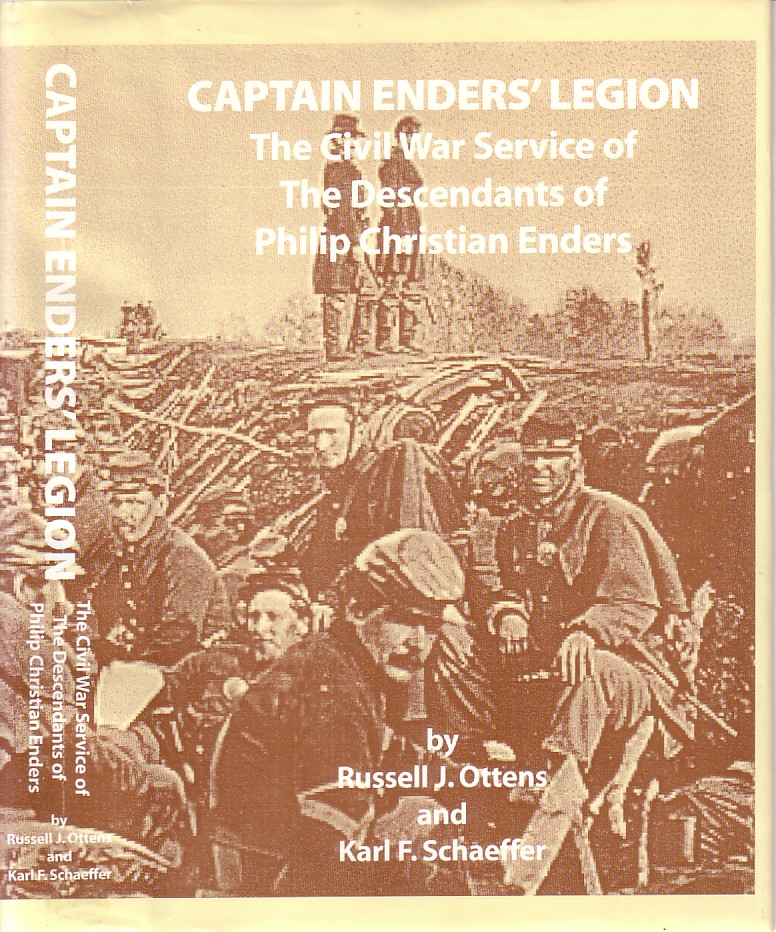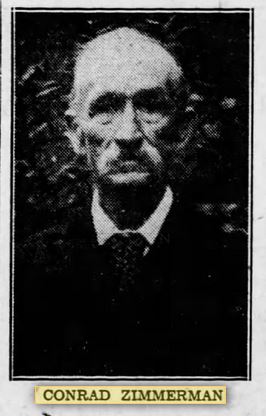Best of Christmas on the Civil War Blog
Posted By Norman Gasbarro on December 24, 2018
Selected past Christmas posts on this blog are listed here with direct links:
Posted By Norman Gasbarro on December 24, 2018
Selected past Christmas posts on this blog are listed here with direct links:
Posted By Norman Gasbarro on December 21, 2018
The information below is edited/adapted from Captain Enders’ Legion, pages 56-58.
George Washington Enders was born 20 March 1837 in Jackson Township, Dauphin County, Pennsylvania. He was the son of George Enders and Susan Fetterhoff who were parents of sixteen children. George W. Enders married Sarah Witman, daughter of John Witman and grand-daughter of Bartholomew Witman. She was born 4 March 1845 in Enders, Pennsylvania and died there on 11 March 1877 and is buried in Fairview Cemetery in Enders. They had seven children: Ellen Savilla Enders, born 29 August 1862; Isaiah O. Enders, born 9 October 1864; Emma Enders, born 15 January 1867, died 25 May 1867; Elmer C. Enders, born 5 July 1868; Lydia Enders and Sadie Enders, twins born 6 February 1871; and John E. Enders born 21 May 1873.
When evidence finally became unmistakable that General Lee with his entire Army of Northern Virginia was north of the Potomac, and marching in force towards the Pennsylvania border, Governor Curtin on 26 Jun 1863 issued his proclamation to call up 60,000 men to be mustered into service. They would remain only so long as the safety and honor of the Commonwealth should require. George was mustered in at Harrisburg on 4 Jul 1863 in the 36th Pennsylvania Infantry Regiment, Company C, “Militia of 1863.” The 36th Regiment was sent to Gettysburg and its commanding officer, Co. H. C. Alleman was made Military Governor of the district, embracing the battleground. It was engaged in gathering in the wounded and stragglers from both armies and collecting debris on the battlefield. In Col. Alleman’s official report, the following property was collected: 26,664 muskets, 9,250 bayonets, 1,500 cartridge boxes, 204 sabers, 14,000 rounds of small-arm ammunition, 26 artillery wheels, 702 blankets, 40 wagon loads of clothing, 60 saddles and bridles, 5 wagons, 510 horses and mules, and six wagon loads of knapsacks and haversacks.
On 11 August 1863, George was discharged in Harrisburg, Pennsylvania, with the rank of Private.
George later married his second wife, Susan Matter, daughter of Solomon Matter and widow of Peter Shaffer. Susan was born 24 June 1851. George was a mechanic and he died 8 April 1905 in Enders and was buried next to his first wife, Sarah. When Susan died in 1934, she also was buried next to Sarah and George in Fairview Cemetery.
__________________________________
At the death of George W. Enders, the Elizabethville Echo provide the following notice regarding his funeral:
Funeral of George W. Enders
George W. Enders Jr., who had been living at Enterline, but moved to Enders, died after having lived in his new place of abode a little more than a week, and was buried last Monday, the pastor of the U. B. Church officiating. He had been ailing for a long time, and was about 67 years of age. Mr. Enders was a member of a family of sixteen children – fourteen boys and two girls. A brother, Isaiah T. Enders, is a groceryman in Harrisburg. A number of relatives came from Lykens on the train Monday morning to attend the funeral, and were met at the station by conveyances to take them to Jacksonville.
__________________________________________

Available from the Enders Family Association.
The news clipping is from Newspapers.com.
Posted By Norman Gasbarro on December 19, 2018
During 2018, two posts were presented here which named several resources that are useful for further study of the Ku Klux Klan in Pennsylvania:
The Ku Klux Klan in Pennsylvania – Some Sources of Information
The Ku Klux Klan in Pennsylvania – More Sources of Information
This post is part of the reporting on hate groups that were active in the Lykens Valley area in the years following the Civil War. It was a widely known fact that the Ku Klux Klan had a significant presence in the Lykens Valley and adjacent valleys during the early years of the 20th Century. This iteration of the Klan was strongly white supremacist and was opposed to equal rights for African Americans, Catholics, Jews, and immigrants.
Posted By Norman Gasbarro on December 17, 2018
The story below is edited/adapted from Captain Enders’ Legion, pages 59-61.
Henry Enders was born 26 Jan 1828 in Jackson Township, Dauphin County, Pennsylvania, the son of John Enders and Sarah Ettinger. Henry married Susan Sweigard, who was born on 15 January 1834 in Powell’s Valley, Dauphin County, Pennsylvania. Her parents were Peter Sweigard and Eva [Mintzer] Sweigard of Enders.
Henry was mustered into service on 21 September 1864 in the 198th Pennsylvania Volunteer Infantry Regiment [198th Pennsylvania Infantry], Company L, in Philadelphia, Pennsylvania. The battle of Peeble’s Farm, Virginia opened on 30 September and here the regiment had its first baptism of fire. On 27 October they moved with the Fifth Corps upon the Southside Railroad, in which it was joined by the Second and Ninth Corps. On 6 December, they marched with the corps for the destruction of the Weldon Railroad. On 5 February 1865 they moved for an assault at Hatcher’s Run. The 198th, as part of the Second Brigade under General Sickel, charged with shouts upon Gen. Mahone’s Confederate forces to re-gain lost ground at the Union’s works. The 198th again rushed to arms and, delivering a volley, sprang upon the foe with a bayonet charge, fighting hand to hand. They regained the Union works and made secure their position.
Other battles and skirmishes were at Dinwiddie Court House, Gravely Run, Old Saw Mill, Boydton Plank Road, and Lewis Farm. After the surrender of General Lee, Confederate General Ewell told General Chamberlain that the 198th, supported by the 185th New York and one battery of the Fifth United States Artillery, were fighting no less than three brigades of the best Confederate troops! On 15 April, the regiment commenced the homeward march. At Arlington Heights it went into camp, where it remained until 4 June when Henry was mustered out with the rank of Private. Returning to Philadelphia, the regiment was received with demonstrations of rejoicing.
Henry and Susan were farmers and had nine children: Mary E. Enders; an infant son; Emma S. Enders; Oliver T. Enders, Joseph H. Enders, Charles R. Enders, Ira E. Enders, Sarah Alice Enders, and Selma Enders. Henry died 18 February 1902 in Enders, Dauphin County, Pennsylvania and is buried in Fairview Cemetery. Susan died 4 Jul 1911 in Lykens, Pennsylvania at the home of her daughter, Sarah Alice, and is buried beside her husband in Enders.
The first local notice of the death of Henry Enders was from the Elizabethville Echo, 20 February 1902:
Then, the Lykens Standard, gave more details on 21February 1902:
This was followed by a report on the funeral which appeared in the Elizabethville Echo, 27 February, 1902:
In 1897, Henry Enders applied for a disability pension based on his Civil War service. He received the pension and collected it to his death, as is shown on the Pension Index Card from Fold3 (below).
Henry Enders is buried at Fairview Cemetery, Enders, Dauphin County, Pennsylvania.
____________________________________

Available from the Enders Family Association.
Posted By Norman Gasbarro on December 14, 2018

Previously on this blog, it was reported that when Conrad Zimmerman died on 22 October 1930, he was the last surviving member of the disbanded Halifax G.A.R. Post. It was also reported that although Conrad Zimmerman was not married, for the last 30 years of his life, he lived with an African American woman, Roxie Weaver, and when he died, she was the informant for his death certificate. Roxie Weaver is buried next to Conrad at the Halifax United Methodist Church Cemetery. She died in 1962.
During the Civil War, Conrad Zimmerman served in the 46th Pennsylvania Infantry, Company I, as a Private, from 22 February 1864 through 16 July 1865.
After the war, Conrad Zimmerman openly supported the white supremacist views of Heister Clymer by signing a call for denial of equal rights to African Americans, both those who were previously slaves and those who were previously freemen. The statement was published in the Harrisburg Patriot of 24 July 1866 and included his name, regiment, company and rank.
Heister Clymer was a white supremacist candidate for Pennsylvania Governor on the Democratic Party ticket in 1866, and was previously profiled here on 26 April 2016.
The call for a meeting of Union Soldiers was printed in the Harrisburg Patriot, 24 July 1866, along with an up-to-date list of Clymer supporters who openly supported Heister Clymer‘s white supremacist views and wanted to deny “negro equality and suffrage” even to those who had been free men before the war.
The undersigned honorably discharged Union soldiers, believing that we battled in the late war for the Union of these States, and had successfully maintained it, view with alarm the persistent efforts of radical men who seem determine, practically to destroy the Union we went forth to save. They would have the community believe that Union soldiers are willing to give up in the hour of victory the great object to which their sacrifices and toll and blood were given….
Therefore we unite in requesting all the honorably discharged officer, soldiers and seamen of Dauphin County who favor the wise and constitutional policy of President Johnson, who oppose the doctrine of negro equality and suffrage, and desire the election of the Hon. Hiester Clymer, to meet in Mass Convention at the Democratic Club Room, Walnut Street, below Third, Harrisburg, at 7 1/2 o’clock, on the evening of the 25 July 1866, for the purpose of electing fourteen delegates to the Convention of Union Soldiers, which is to assemble in this city [Harrisburg] on Wednesday, 1 August 1866.
The Dauphin County veterans who signed the racist petition calling for the meeting were from a variety of regiments and social levels. Included in the list were some residents of Upper Dauphin County, the area north of Peter’s Mountain – all of which is included in the geographic area of the Civil War Research Project.
Conrad Zimmerman was only one of many honorably discharged Union soldiers who openly supported the white supremacist gubernatorial campaign of Heister Clymer in 1866. The full list of those with a connection to Upper Dauphin County will be presented over time.